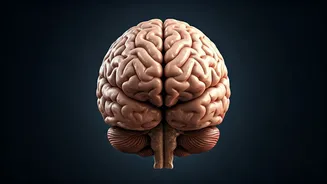Embrace Daily Exercise
Regular physical activity is a cornerstone for brain health. Exercise isn't just about physical fitness; it has a significant impact on cognitive function.
Daily exercise helps increase blood flow to the brain, delivering more oxygen and nutrients essential for optimal performance. Additionally, it stimulates the release of brain-derived neurotrophic factor (BDNF), a protein that supports the growth and survival of brain cells. This process is crucial for learning, memory, and overall brain plasticity. Incorporating exercise, even in short bursts throughout the day, can contribute to maintaining a sharp mind and improving cognitive abilities. Consider brisk walking, jogging, swimming, or any activity that elevates your heart rate. Aim for at least 30 minutes of moderate exercise most days of the week to maximize the benefits and help keep your brain sharp.
Prioritize Quality Sleep
Sleep is often underestimated, but it plays a crucial role in maintaining cognitive health. During sleep, the brain consolidates memories, clears out toxins, and repairs itself. Insufficient sleep can lead to impaired memory, reduced concentration, and increased risk of cognitive decline. Aim for 7-9 hours of quality sleep each night to allow your brain to function optimally. Establish a consistent sleep schedule, create a relaxing bedtime routine, and ensure your sleep environment is conducive to rest. This might include a dark, quiet, and cool room. Avoid screen time before bed, as the blue light emitted from devices can interfere with sleep. Practicing good sleep hygiene is a fundamental habit for promoting brain health and ensuring you stay sharp.
Fuel Your Brain Well
The food we eat profoundly impacts our brain function. A balanced diet rich in essential nutrients is vital for optimal cognitive performance. Focus on consuming foods packed with antioxidants, healthy fats, vitamins, and minerals. Include plenty of fruits, vegetables, whole grains, and lean proteins in your diet. Healthy fats, found in sources like avocados, nuts, and olive oil, are particularly beneficial for brain health. They support brain cell structure and function. Limit processed foods, sugary drinks, and excessive alcohol, as they can negatively impact cognitive function and increase the risk of cognitive decline. Incorporating brain-boosting foods into your daily meals will directly contribute to maintaining a sharp and active mind.
Engage Mental Activities
Just like physical muscles, the brain needs exercise to stay strong and functional. Engaging in mentally stimulating activities can help keep your mind sharp and improve cognitive abilities. Regularly challenge your brain with puzzles, games, or learning new skills. Crosswords, Sudoku, and other brain-training games can help improve memory, focus, and problem-solving skills. Learning a new language, playing a musical instrument, or taking up a new hobby can also provide valuable mental stimulation. These activities promote neuroplasticity, the brain's ability to adapt and form new connections, ensuring that your mind remains active and agile. Making mental exercise a part of your daily routine contributes significantly to a sharper brain.
Stay Socially Connected
Social interaction is essential for maintaining cognitive health and overall well-being. Social engagement stimulates the brain and can help protect against cognitive decline. Interacting with others, whether through conversations, group activities, or community involvement, provides opportunities for mental stimulation and emotional support. Strong social connections have been linked to improved cognitive function and a lower risk of dementia. Make an effort to maintain meaningful relationships with friends and family. Participate in social activities, and engage in conversations that challenge your thinking. Even simple social interactions can help keep your brain active and prevent it from feeling isolated, leading to better cognitive function.













